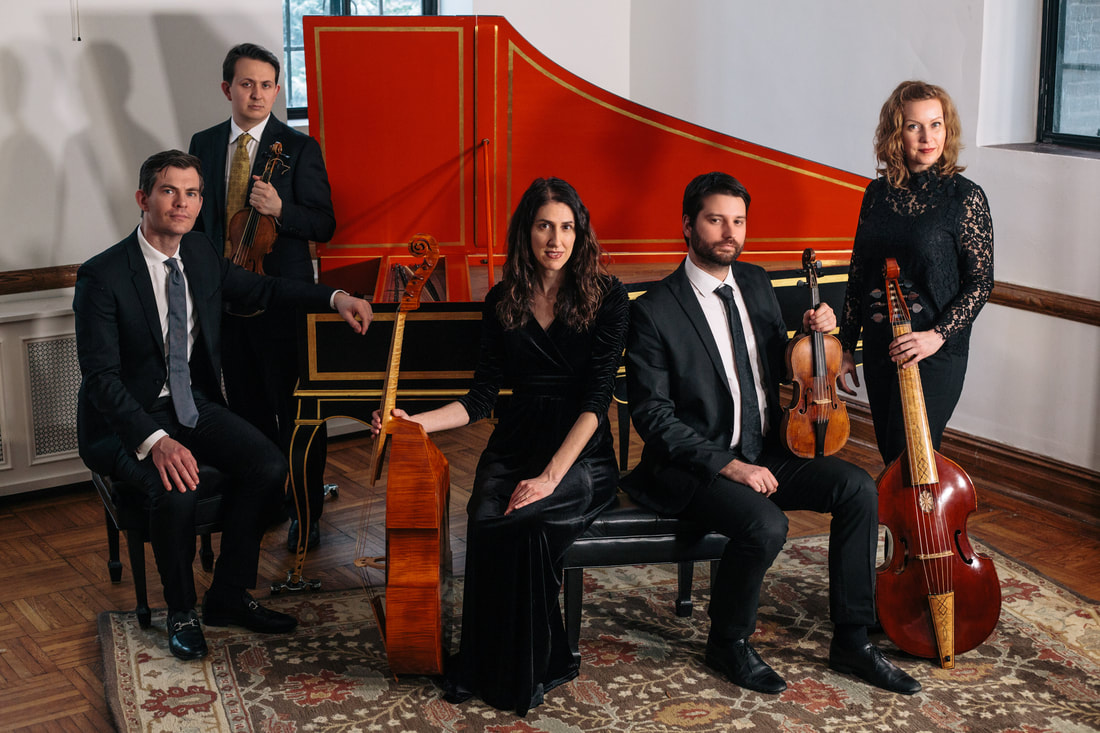By Her Hand: Italian Women Composers from the Time of Gentileschi
Live Premiere: Thursday, March 31, 2022, at 1PM
This performance is presented in conjunction with the Detroit Institute of Arts exhibition By Her Hand: Artemisia Gentileschi and Women Artists in Italy, 1500–1800, and was made possible through a generous grant from the Samuel H. Kress Foundation.
✨ Program ✨
Se scior si ved'il laccio | Maddalena Casulana (1544–1590)
Lasciatemi qui solo | Francesca Caccini (1587–1640)
Quando spiega l’insegn’al sommo padre | Paola Massarenghi (b. 1565; fl. 1585)
Due luci ridenti | Settimia Caccini (1591–1638)
Galliarda prima, from Il terzo libro | Carlo Farina (c. 1600–1639)
L’eraclito Amoroso | Barbara Strozzi (1619–1677)
Se scior si ved'il laccio | Maddalena Casulana (1544–1590)
Lasciatemi qui solo | Francesca Caccini (1587–1640)
Quando spiega l’insegn’al sommo padre | Paola Massarenghi (b. 1565; fl. 1585)
Due luci ridenti | Settimia Caccini (1591–1638)
Galliarda prima, from Il terzo libro | Carlo Farina (c. 1600–1639)
L’eraclito Amoroso | Barbara Strozzi (1619–1677)
Program Note
From a beloved lament to a world premiere, our program presents some of the many facets of the musical lives of women in sixteenth- and seventeenth-century Italy. We begin with Maddalena Casulana, who was born in 1544 likely in Casula, near Sienna, the first woman to have her music printed during her lifetime. Her pastoral madrigal Se scior si ved'il laccio circulated widely due to its polish and literary appeal: though small in scale, it is rich with chordal texture and syncopation. Francesca Caccini came of age at the turn of the seventeenth century in a musical family in Florence. Daughter of Giulio Caccini, one of the progenitors of monody and early opera, she was an acclaimed singer and teacher as well as composer. The earliest woman to have composed an opera, she gained international acclaim as a singer performing in the festivities for the marriage of Henri IV to Marie de’ Medici, ultimately becoming the highest paid musician on the Medici payroll. Caccini likely crossed paths with Artemisia Gentileschi in Florence, and through her work Lasciatemi qui solo we see the Florentine craze for the musical lament, a genre that sounds some of the same voices of the “fallen women” also depicted in many of the works in By Her Hand.
In the center of our program is the one extant work by Paola Massarenghi, the madrigal Quando spiega l’insegn’al sommo padre, which until now has not been recorded. Massarenghi wrote the work at the age of twenty, then disappears from the historical record. It was included as the penultimate piece in F. Arcangelo Gherardini’s Primo libro dei madrigali à cinque voci, published in 1585, which enabled its circulation. We do not know where Massarenghi lived, but the dedication in Gherardini’s volume is inscribed with Ferrara, a city with a strong tradition of music making by women, including the d’Este court’s concerto delle dame and at the convent of S. Vito. Settimia Caccini, Francesca Caccini’s younger sister, follows on our program, with Due luci ridenti, a strophic aria, one of the most popular genres of the first third of the seventeenth century. A relatively lightly ornamented piece, it has its roots in the older strophic song rather than the more popular solo madrigal.
Our program concludes with a sprightly instrumental galliard by Carlo Farina and the monumental L’eraclito Amoroso of Barbara Strozzi. Written in Dresden in the late 1620s, Farina’s Galliarda prima was produced for a court with a large instrument collection and one of Europe’s earliest proto-museums. The dance’s virtuosic appeal ushers in a new fascination with musical works as objects to behold, one of the philosophic underpinnings of rococo and classical music in centuries to come. Strozzi’s L’eraclito Amoroso (1651) may be one such canonic “work.” Alternating between sections of recitative (speech-like singing) and arioso (melodic singing), the piece unfurls over a four-note descending motif in the form of a passacaglia with a text staking a claim for a woman’s point of view. “I singulti mi sanano, / I sospir mi consolano,” the singer cries — most likely originally Strozzi, herself — “My sobs heal me, / And my sighs console me.”
—Elizabeth Weinfield
New York, NY
March 2022
TEXTS and TRANSLATIONS
Madalena Casulana
Se scior si ved'il laccio
Text: possibly Jacopo Sannazaro (1453–1530), a 16th-century Petrarchist
Se sciôr ved'il laccio a cui dianz’io
Vedend'il vag’aspetto
Si forte mi legai, s'altro desio
O s’altro fuoco più mi scald'il petto,
Te ne ringrazi'amore
Se donn’ha mai pietà del mio dolore.
If someone sees that I am free of the snare that tied me up so strongly
when I gazed upon that graceful form before, then,
even though another desire or another fire may burn my breast more,
I thank you, Love, provided that lady ever takes pity on my sorrow.
(Translation: Ellen D. Lerner)
✨
Francesca Caccini
Lasciatemi qui solo
Lasciatemi qui solo
Torante augelli al nido
Mentre l’anim’e ‘l duolo
Spiro su questo lido
Altri meco non voglio
Ch’un freddo scoglio
E ‘l moi fatal martire
Lasciatemi moirire
Leave me here alone,
Return, birds, to your nests,
While my soul, and my pain
I give up on these shores.
I want no one else with me
Other than a cold rock,
And my fated death.
Leave me to die
Dolcissime sirene
Che’n si pietoso canto
Raddolcite mie pene
Fate soave il pianto
Movet’ il nuoto altronde
Togliete all’onde
I crudi sdegni, e l’ire
Lasciatemi morire
Sweetest sirens
Who with such merciful song
Sweeten my sufferings and
Soften my weeping
Go elsewhere to swim
Dampen the waves’
Cruel scorn, and their ire
Leave me to die.
Placidissimi venti
Torante al vostro speco
Sol miei duri lamenti
Chieggo che restin meco
Vostri sospir non chiamo
Solingo bramo
I miei dolor finire
Lasciatemi morire
Calmest winds
Return to your cave
I ask that only my harsh laments
Remain with me
I do not call upon your sighs
Alone I wish
To end my sufferings
Leave me alone to die.
Fekicissimi amanti
Torante al bel diletto
Fere eccels’o notanti
Fuggite il mesto aspetto
Sol dolcezza di morte
Apra le porte
All’ ultimo Languire
Lasciatemi morire
Happiest lovers
Return to your beautiful pleasures
Wild beasts, whether birds or fish
Flee from this sad countenance
Only the sweetness of death
Should open its doors
To this final languishing
Leave me to die.
Avarissimi lumi
Che su ‘l morir versate
Amarissimi fiumi
Tard’e vostra pietate
Gia mi sento mancare
O luci avar’e
Tarde al mio conforto
Gia sono esangu’e smorto
Most avaricious eyes
That on point of death spill
The bitterest rivers
Your pity comes too late
Already I feel myself fail
Oh eyes, stinging
And slow to comfort me
I am already bloodless and lifeless.
✨
Paola Massarenghi
Quando spiega l’insegn’al sommo padre
Text: Anonymous
Quando spiega l'insegn'al sommo padre
e arma le sue squadre per guardia della sue gente diletta
O per far contr'a rei giusta vendetta
Tu come saggia duce il campo guidi
e il nemic'alla battaglia sfidi.
When one unfurls the insignia of the highest father
And arms their squadrons to protect their chosen people
In order to make rightful revenge against kings
You like a wise guide lead the field
And challenge the enemy to battle.
(Translation: Thomasin LaMay)
✨
Settimia Caccini
Due luci ridenti
Text: Anonymous
Due luci ridenti con guardo sereno
di dolci tormenti m'ingombrano il seno.
Ma lampi d'Amore rapiscono il core
con furto gentile la libertà.
Pur lieto vivrà quest'alma cantando,
s'adora penando celeste beltà.
Due labbra di Rose con dolci rossori
le paci amorose promettono ai cori.
Ma in quel bel sereno s'annida il veleno
che uccide dell'alme la libertà.
Pur lieto vivrà ...
Due braccia soavi, mie dolci catene,
far posson men gravi l'acerbe mie pene.
Da quest'io desio sia servo il cor mio,
si perda, si perda la libertà.
Pur lieto vivrà...
Due risi, due sguardi, due care parole,
sian fiamme, sian dardi, morir non mi duole.
Morrommi beato, morrò fortunato
e perderò lieto la libertà.
Pur lieto vivrà...
Two laughing lights, with a serene glance,
fill my breast with sweet torments.
But flashes of love steal, with gentle theft,
liberty from my heart.
Yet will this soul live happily, singing,
if, suffering, it adores celestial beauty.
Two lips of roses, with sweet blushing,
promise amorous peace to hearts.
But in that lovely serenity is nested a poison
which kills the liberty of the soul.
Yet will this soul live happily....
Two gentle arms, my sweet chains,
can make less terrible these bitter pains of mine.
From this, I wish for my heart to be your servant,
and may it lose, may it lose its liberty.
Yet will this soul live happily ...
Two laughs, two glances, two sweet words:
may they be flames, may they be arrows,
dying does not pain me. I shall die blessed,
I shall die fortunate, and I shall happily lose my liberty.
Yet will this soul live happily...
(Translation: Candace Smith)
✨
Barbara Strozzi
L’eraclito Amoroso
Text: Anonymous
Udite amanti la cagione, oh Dio!
Ch'a lagrimar mi porta:
Nell'adorato e bello idolo mio,
Che si fido credei, la fede morta.
Listen, you lovers, to the reason - oh God!
For my weeping:
In my adored and beautiful idol,
Who I believed to be faithful, faith is dead.
Vaghezza ho sol di piangere,
Mi pasco sol di lagrime,
Il duolo mia delizia
E son miei gioie i gemiti.
I find charm only in weeping,
I nourish myself by my tears,
Grief is my delight
And my moans are my joy.
Ogni martire aggradami,
Ogni dolor dilettami,
I singulti mi sanano,
I sospir mi consolano.
Every anguish pleases me,
Every sadness is my delight,
My sobs heal me,
And my sighs console me.
Ma se la fede negami
Quell' incostante e perfido,
Almen fede serbatemi
Sino alla morte, O lagrime!
But if he denies faith,
He who is fickle and treacherous,
At least faithfully serve me
Until death, oh my sorrow!
Ogni tristezza assalgami,
Ogni cordoglio eternisi,
Tanto ogni male affligami
Che m'uccida e sotterrimi.
Every tear soothes me,
All my mourning lasts forever,
So much does each ill afflict me
That it kills and buries me.
(Translation: Rosemary Galton)
Proudly powered by Weebly



